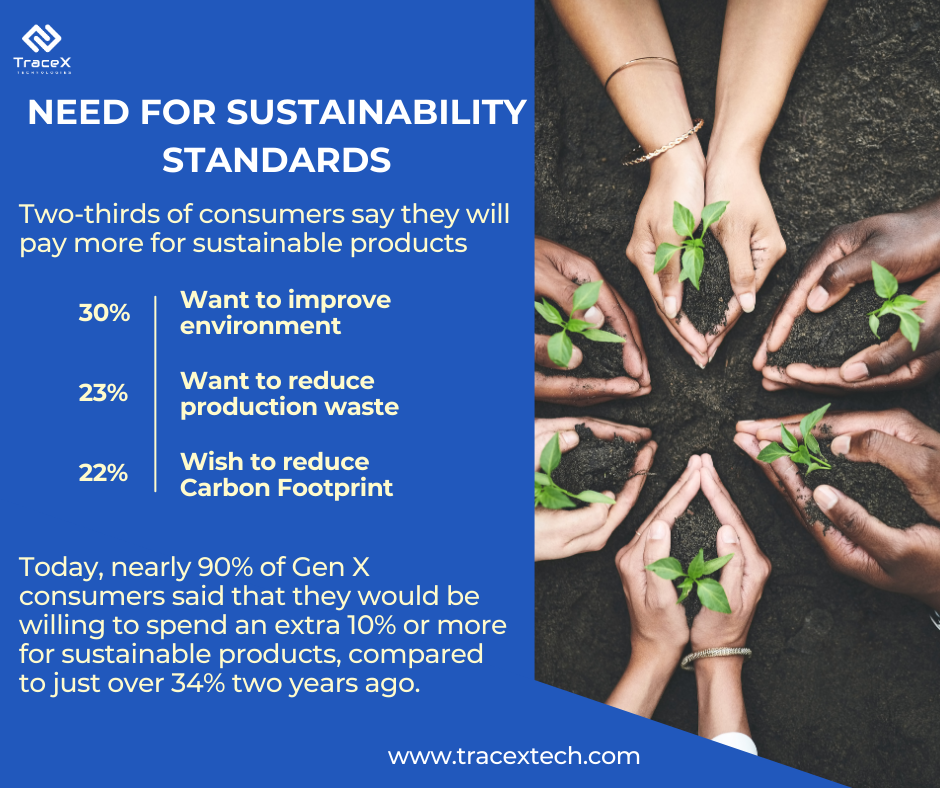Contact: +91 99725 24322 |
Menu
Menu
Quick summary: Unlock the world of Voluntary Sustainability Standards (VSS) with our comprehensive blog. Discover the types, significance, and impact of VSS on global sustainability efforts. Dive into the complexities and benefits of adhering to these standards in various industries. Get insights into how VSS contribute to creating a more sustainable future for our planet.

Did you know that over 450 voluntary sustainability standards exist globally, shaping industries from agriculture to textiles? These standards are no longer just a trend—they’re a critical tool for businesses aiming to meet growing consumer and regulatory demands for sustainability.
A recent study by NielsenIQ found that 78 percent of US consumers say that a sustainable lifestyle is important to them.
However, navigating this landscape can feel overwhelming. Which standards matter most for your business? How do you ensure compliance while maintaining profitability? Without clear guidance, companies risk falling behind in an increasingly sustainability-focused market. VSS offer a pathway to align operations with ethical, environmental, and social goals, but understanding their nuances is key to leveraging their full potential. Let’s dive in to explore how they can drive sustainable growth.
Key Takeaways
Voluntary Sustainability Standards (VSS) are a collection of standards, criteria, or requirements that firms, organisations, or industries voluntarily embrace to promote ecologically and socially responsible behaviours throughout their supply chains. These standards address issues such as environmental impact reduction, fair labour practices, social responsibility, and ethical sourcing.
As worries about environmental deterioration, social inequity, and resource depletion mount, sustainability has become increasingly important across a wide range of industries. Agriculture, manufacturing, textiles, energy, and tourist industries understand the value of incorporating sustainable practices to reduce negative impacts, improve reputation, comply with regulations, and meet consumer demand for eco-friendly products and ethical production techniques.
VSS encourage firms to embrace sustainable practices voluntarily, beyond legislative constraints. VSS contributes to the standardisation of sustainable processes, promotes transparency, and fosters customer trust by establishing explicit norms and requirements. They help enterprises committed to sustainability gain market access, push innovation towards greener solutions, and foster stakeholder engagement to effectively address global sustainability concerns. Overall, VSS play an important role in promoting sustainability goals across industries by encouraging responsible production and consumer behaviours.
Voluntary Sustainability Standards (VSS) play a pivotal role in shaping agriculture certifications by setting criteria that address environmental, social, and economic challenges.
Some well-known voluntary sustainability standards include:
Forest Stewardship Council (FSC): FSC certification ensures that forest products come from responsibly managed forests that provide environmental, social, and economic benefits.
Rainforest Alliance: The Rainforest Alliance certification focuses on promoting sustainable agriculture, forestry, and tourism practices that conserve biodiversity and improve livelihoods.
Fairtrade International: Fairtrade certification ensures that producers in developing countries receive fair prices and premiums for their products, along with support for sustainable farming practices and community development.
Organic Certification: Various organic certification bodies, such as the United States Department of Agriculture (USDA) Organic and the European Union Organic Regulation, certify products produced using organic farming methods that avoid synthetic pesticides, fertilizers, and genetically modified organisms (GMOs).
Marine Stewardship Council (MSC): MSC certification ensures that seafood products come from sustainable and well-managed fisheries, helping to protect marine ecosystems and support responsible fishing practices.
Carbon Trust Standard: The Carbon Trust Standard certifies organizations for measuring, managing, and reducing their carbon emissions, demonstrating their commitment to addressing climate change.
Roundtable on Sustainable Palm Oil (RSPO): RSPO certification ensures that palm oil is produced sustainably, without causing deforestation, habitat destruction, or human rights abuses.
Consumers are shifting their spending toward products with ESG-related claims.
Environmental criteria in sustainability certifications are designed to reduce environmental impacts throughout the product’s lifecycle. This involves lowering greenhouse gas emissions, conserving natural resources, reducing pollution and waste output, safeguarding biodiversity, and encouraging renewable energy and sustainable land use practices. Environmental standards attempt to guarantee that items and processes are environmentally responsible and help to preserve and restore ecosystems.
Social criteria focus on the social dimensions of sustainability, such as fair trade practices, labour rights, human rights, community engagement, and equal economic opportunity. These criteria frequently include fair wages and working conditions, gender equality, child labour prohibition, access to education and healthcare, indigenous rights protection, and community development activities. Social criteria seek to maintain human dignity, promote social justice, and enhance the well-being of workers, communities, and marginalized groups affected by production processes.
Economic criteria aim to promote economic sustainability and resilience. This includes guaranteeing fair and equitable sharing of economic advantages along the supply chain, assisting smallholder farmers and local producers, encouraging economic diversification and value addition, and promoting long-term economic viability. Economic criteria include affordability, accessibility, and economic empowerment, with the goal of creating value while balancing economic growth with social and environmental factors.
The requirements for governance and transparency include the establishment of clear rules, procedures, and systems to assure compliance with sustainable standards while also encouraging accountability and transparency. This involves public reporting, stakeholder participation, independent auditing and certification, grievance procedures, and ethical corporate practices. Governance and transparency requirements strive to develop confidence, foster integrity, and ensure stakeholders have access to accurate information about the social and environmental, and economic performance of products and processes.
Adhering to sustainability norms provides tangible advantages to both the environment and communities, encouraging long-term environmental stewardship and social well-being.

Technological improvements play an important role in facilitating the implementation of Voluntary Sustainability Standards (VSS) by improving transparency, traceability, and data management throughout supply chains. Blockchain, IoT, and AI technologies offer real-time monitoring and tracking of products and resources, ensuring sustainability from sourcing to distribution. Blockchain, for example, can provide immutable records of transactions and certificates, increasing trust and accountability in supply chains. IoT devices can collect data on environmental conditions, resource utilisation, and labour practices, allowing for performance monitoring and improvement activities. AI systems can analyse massive volumes of data to detect patterns, optimise processes, and predict dangers, hence facilitating decision-making and continual improvement in sustainable practices. These technological advancements empower businesses to enhance transparency, efficiency, and accountability in implementing VSS, driving progress towards more sustainable and responsible supply chains.
The TraceX Sustainability platform offers an integrated and technology-driven approach to overcome challenges in implementing Voluntary Sustainability Standards (VSS) in agriculture.
CSR foundations can leverage reliable data and technology to promote sustainability in farming practices. It focuses on empowering farmers with better farming methods and providing them with market access for sustainable organic farming. By using advanced technology solutions, foundations are able to track data, ensure compliance with sustainability standards, and streamline processes. This benefits farmers by improving their practices, increasing their profitability, and helping them access eco-conscious markets. In turn, CSR foundations benefit by driving impactful environmental outcomes and aligning with their sustainability goals. Through this collaboration, both farmers and organizations are better equipped to make a lasting difference in promoting sustainable agriculture practices.
By leveraging digital tools, TraceX empowers stakeholders to efficiently implement and maintain compliance with VSS, driving sustainable agricultural practices and enhancing market access for certified products.
Voluntary Sustainability Standards (VSS) are essential tools for fostering sustainable agriculture by setting clear benchmarks for environmental, social, and economic practices. They help stakeholders, from farmers to consumers, align with global sustainability goals while ensuring compliance and enhancing market access. However, their implementation requires robust data management, transparency, and collaboration across supply chains. Embracing technology solutions like TraceX can simplify the journey toward VSS compliance, making sustainable agriculture not only possible but impactful.
VSS are guidelines or benchmarks that ensure agricultural practices meet sustainability goals, focusing on environmental protection, fair labor, and economic viability.
VSS enhance transparency, enable market differentiation for sustainably produced goods, and help stakeholders comply with global regulations and consumer demands for sustainable products.
Platforms like TraceX offer end-to-end traceability, data validation, automated reporting, and stakeholder collaboration to make VSS compliance efficient and scalable.
